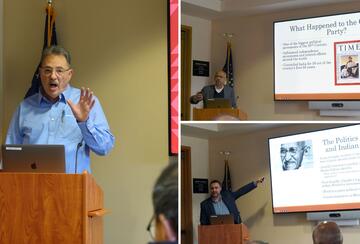News

FSI scholars and civic and political Ukrainian leaders discussed the impact of the largest conflict in Europe since World War II, three years after Russia's invasion of Ukraine.

Applications are now being accepted for the spring 2025 session. Interested high school students in Japan should apply by March 22, 2025.

Marquette University Professor of Political Science Julia Azari explored the link between race, presidential transformation, and impeachment crises in a CDDRL research seminar.

New Continuing Studies Course with CDDRL Scholars on Geopolitics in the 21st-Century Middle East
Open for enrollment now through Stanford Continuing Studies, "Geopolitics in the 21st-Century Middle East: Insights from Stanford Scholars and Other Experts" will run online for ten weeks on Wednesdays, from April 2 through June 4.

In a conversation with ARD Associate Director Hesham Sallam, Bassam Haddad, a leading expert on Syria and Associate Professor at George Mason University, addressed the factors that led to Assad’s fall, the role of international actors, and the uncertain prospects of Syria under its new leadership.

Political scientist Didi Kuo challenged the narrative that political parties are the problem and said that strengthening their connections to the citizenry is the key to addressing today’s democratic crisis.
Stanford Scholars Larry Diamond, Šumit Ganguly, and Dinsha Mistree, co-editors of the recently released book "The Troubling State of India's Democracy," gathered to discuss how the decline of opposition parties in India has undermined the health of its democracy.
A new study by SHP's Maria Polyakova sheds important new light on a key question in health care economics.
The Stanford Cyber Policy Center and the Paris Bar Association hosted a round table discussion on "AI and the Future of Democracy: Challenges and Opportunities," at the Maison du Barreau in Paris

Michael McFaul and Steven Pifer share analysis of where international security seems to be headed, and what it might mean for the U.S., Ukraine, and their partners.
India, Before It Was Cool
Šumit Ganguly joins Dinsha Mistree on the Hoover Institution's "Matters of Policy and Politics" podcast with host Bill Whalen to discuss what the future holds for India, which has the world’s largest population and whose demographics are changing, as well as its tastes in work, leisure, and family planning.
There’s an important distinction between trust and trustworthiness, according to Anat Admati, the George G.C. Parker Professor of Finance and Economics at Stanford Graduate School of Business and co-author of "The Bankers’ New Clothes."
Professor Stephen Luby marries philosophy with medicine in his work in epidemiology in low-income countries across South Asia.
Exploring the unifying potential of economics against intolerance, polarization, and violence with Associate Professor of Political Economy Saumitra Jha.

Kandel's talk with Visiting Fellow in Israel Studies Amichai Magen focused on his work at the Israel Strategic Futures Institute (ISFI) in diagnosing what he and his colleagues identify as internal existential risks for Israel and the policy ideas generated by ISFI in response to those risks.
We sat down with Senior Research Scholar Huan Wang to learn more about her journey to Stanford and drive to address educational disparities and promote human development in China and globally.

American University Political Scientist Keith Darden examines how the Russian-Ukrainian war is reshaping European institutions.

In her new book, Didi Kuo argues political parties no longer exist to represent their constituents
Kuo, a fellow at the Freeman Spogli Institute for International Studies, says this evolution lays the groundwork for serious imbalances in who democracy serves.
![[Left to right]: Dawn Garcia, Director of the John S. Knight Fellowships; Roman Anin, Journalist and co-founder of iStories Media; Michael McFaul, director of the Freeman Spogli Institute for International Studies at Stanford University](https://fsi9-prod.s3.us-west-1.amazonaws.com/s3fs-public/styles/360x244/public/2025-02/trump_and_putin_jsk_mcfaul_hero_0.png?h=c4d9845d&itok=jFF8isSF)
At an event hosted by the John S. Knight Journalism Fellowships at Stanford, Michael McFaul and journalist Roman Anin discussed U.S.-Russia relations under Putin and Trump and the role of journalism in combatting anti-democratic ideology.
Managing political conflict starts with understanding power dynamics. Associate professor of political economy Saumitra Jha shares how you can leverage monopoly power, build networks, and create cooperative solutions to influence outcomes.
Shavit, in conversation with FSI Visiting Fellow in Israel Studies Amichai Magen, discussed the threats Israel faces — particularly from Iran and its proxies — while reassessing historical defense doctrines and the evolving regional landscape, including the future of Gaza.
Alice Siu, Associate Director of CDDRL’s Deliberative Democracy Lab, demonstrates the wide-ranging effects of deliberation on democracy.

The martial law episode — and all that followed — “reflects a broader global pattern of democratic erosion but also showcases Korea’s unique strengths," Stanford sociologist Gi-Wook Shin says in an interview with The Diplomat magazine.
Companies that work with benefits consulting firms emphasize finances over seeking employee feedback about health benefits.
Professor Adida uses quantitative and field methods to study how countries manage new and existing forms of diversity.

















